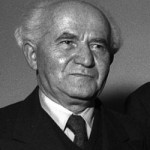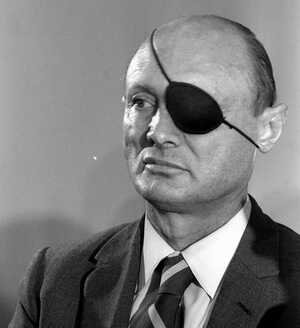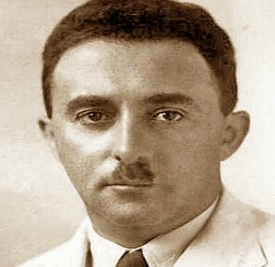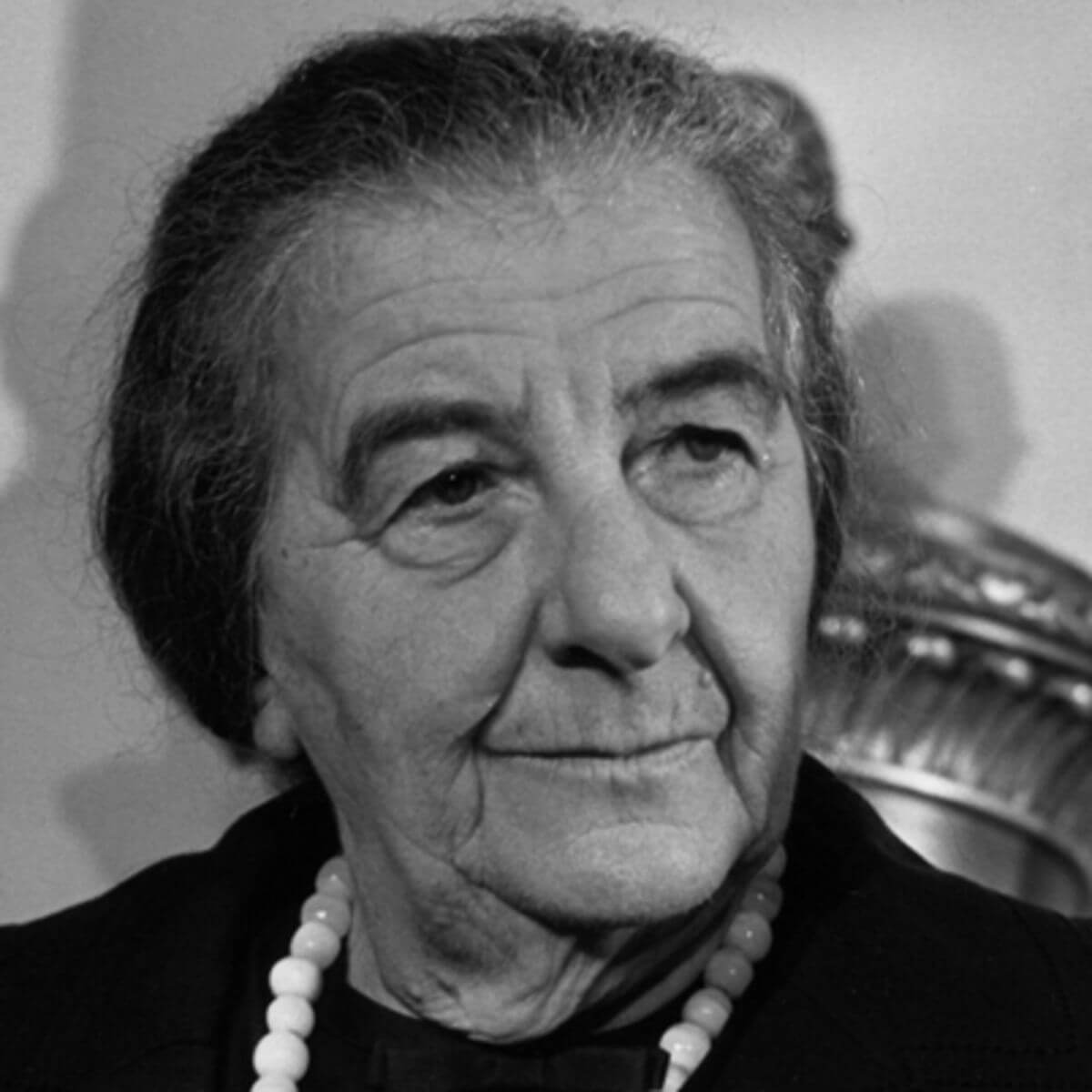- Major-General Dani Rothschild, the Coordinator of Government Operations in Judea and Samaria and the Gaza District, Washington, to Prime Minister and Defence Minister Yitzhak Rabin and Foreign Minister Shimon Peres, Jerusalem; September 2 1993
Israel State Archives, A/7702/3
A report on a meeting with a member of the inter-Arab steering team in Washington, who described a meeting in which PLO representative Nabil Shaath explained the importance of the Declaration of Principles, which was about to be signed between Israel and the Palestinians.
Israel State Archives
Mubarak congratulates Rabin for his courage in going ahead with the signing of the Declaration of Principles (Oslo Agreement). He telephoned Arafat and told him that Rabin will face strong opposition. Rabin makes it clear that he is concerned about the practical implementation of the agreement. In his opinion, this is his direct responsibility as defence minister. The question is whether a real partner will be found to implement the agreement. Egypt’s support is important in solving the Gaza problem, which is the main one. Mubarak also promises to talk to President Assad, who is about to visit Egypt.
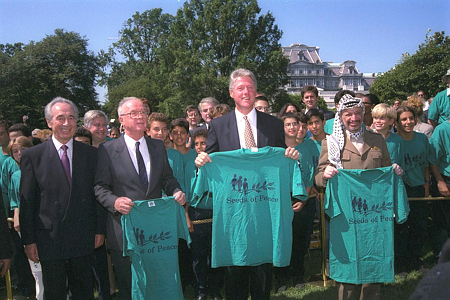
Shimon Peres, Yitzhak Rabin, President Clinton and Yasser Arafat with members of the “Seeds of Peace” youth movement, 13 September 1993. Photograph: GPO
- Statement by the “Meimad” movement after a Meeting with Prime Minister and Defence Minister Yitzhak Rabin; 22 September 1993
Israel State Archives, GL/23139/11
The leaders of the Meimad religious movement, Rabbi Yehuda Amital and Dr. Yehuda Ben-Meir, expressed their appreciation for the government’s courageous decision in signing the Declaration of Principles.
- Record of Prime Minister and Defence Minister Ytzhak Rabin’s Meeting with PLO Chairman Yasser Arafat; Cairo, October 6 1993
Israel State Archives, GL/23139/11
Main points of a conversation on establishing committees for negotiations on the implementation of the Declaration of Principles; the Palestinians’ request for gestures and more lenient treatment by Israel.
- Yehoshua Zakai, Head of the Follow-up and Control Division of the Prime Minister’s Office, Jerusalem, to Jacques Neriah, the Prime Minister’s Policy Adviser, Jerusalem; October 17 1993
Israel State Archives, A/7764/10
A report on the first meeting with the Palestinian delegation in Taba on October 13, together with the agreed agenda.
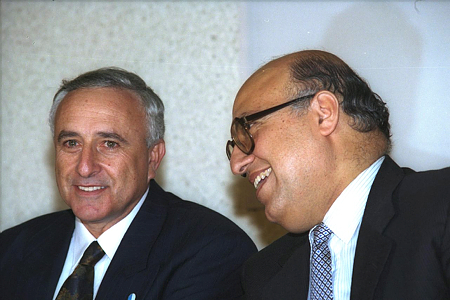
Deputy Chief of Staff Amnon Lipkin-Shahak and the head of the Palestinian delegation, Dr. Nabil Shaath. Photograph: Avi Ohayon, GPO
- The Centre for Political Planning, Foreign Ministry: The Declaration of Principles on Interim Arrangements for Self-Government, Problems and Possible “Breaking Points”; Jerusalem, October 17 1993
Israel State Archives, MFA/8595/1
According to the writer, the timetable for signing an agreement on Gaza and Jericho and its implementation is not realistic. Discusses the complex problems involved, including the definition of the jurisdiction and powers of the self-governing authority, security issues and especially the establishment of the Palestinian police and border control. These problems also have policy implications.
- Jacques Neriah, the Prime Minister’s Policy Adviser, Jerusalem, to Prime Minister Yitzhak Rabin and Shimon Sheves, Director General of the Prime Minister’s Office, Jerusalem; October 24 1993
Israel State Archives, A/7764/10
Reports on a phone call that day with a PLO representative about the incident in Khan Yunis.
- Coordination Department, Situation Room in the Foreign Ministry, Jerusalem, to the Heads of Israel’s Missions Abroad; October 29 1993
Israel State Archives, MFA/11458/9
A summary of a meeting of the Foreign Ministry senior staff on October 25: Oded Eran gave a report on the Taba talks, focusing on security and transfer of powers issues. He said the intense exposure of the talks to the media makes it difficult to negotiate. Statement by Director-General Uri Savir on the meeting of the steering committee of the donor countries, preparations for the economic talks, and the internal debate in the PLO between a pragmatic group and Arafat, who represents a more centralized approach in the economic context.
- Information Division, Communications Branch in the Foreign Ministry, Jerusalem, to Israel’s Missions Abroad; November 7 1993
Israel State Archives, MFA/10429/2
An abstract in Hebrew (as published in the Haaretz newspaper) of the documents submitted by the Israeli delegation and the Palestinian delegation to the Taba talks, detailing each side’s security conception.
- Joel Singer, the Legal Adviser to the Foreign Ministry, Jerusalem, to Foreign Minister Shimon Peres, Jerusalem; November 14 1993
Israel State Archives, MFA/11458/9
A summary of the two days of discussions between Israel and the PLO in Cairo on November 8-9, 1993, and a draft of Israel’s position paper on the Palestinian Authority’s structure and powers. The paper will be presented to Rabin for discussion and then forwarded to the PLO.
- Israel Embassy in Cairo to Eli Avidan, Centre for Political Research, Foreign Ministry, Jerusalem; November 18 1993
Israel State Archives, MFA/11458/9
The contents of a press briefing by Nabil Shaath to reporters on the Taba talks that week. He said the talks were being moved to Cairo to reduce the media coverage.
- Oral Message from PLO Chairman Yasser Arafat, Cairo, to Prime Minister and Defence Minister Yitzhak Rabin, Jerusalem; November 23 1993
Israel State Archives, GL/23139/13
A proposal to move the site of the economic talks, his hope for an agreement.
- Oded Eran, Assistant Director-General in Charge of Economics, Paris, to Foreign Minister Shimon Peres, Deputy Foreign Minister Yossi Beilin, Director General Uri Savir and Legal Adviser Joel Singer, Jerusalem; November 24 1993
Israel State Archives, MFA/10434/10
A report on the talks on economic issues in Paris.
- Eytan Benzur, Deputy Director General of the Foreign Ministry, Jerusalem, to Itamar Rabinovitch, the Ambassador, Jeremy Issacharoff , the Minister- Counsellor at the Israel Embassy in Washington; November 29 1993
Israel State Archives, MFA/11458/9
Reports on a conversation with William Brown, US Ambassador to Israel, and James Larocco, Deputy Head of Mission at the embassy. They described Arafat’s attempt to persuade the United States to intervene in the negotiations between Israel and the Palestinians. However the US will only join in the later stages of the negotiations. Prospects for the Secretary of State’s visit to the Middle East.
- Yigal Pressler, the Prime Minister’s Adviser on Counter Terrorism, Jerusalem, to Yitzhak Rabin, Prime Minister and Minister of Defence, Jerusalem; December 7 1993
Israel State Archives, A/7705/6
His assessment of the likely situation when autonomy in Gaza and Jericho is implemented. In his opinion, as the negotiations progress, terrorism against Israelis in the Occupied Territories and possibly inside Israel will increase. After the PLO forces enter Gaza and Jericho, the attacks in these areas will decrease, but there is a danger of increased attacks in the other parts of the territories and on the other side of the border with Israel (the Green Line). Proposals to prevent a chain effect of attacks and reactions.
- Address by Prime Minister and Defence Minister Yitzhak Rabin at a Meeting with the Editors’ Committee; Tel Aviv, December 8 1993
IDF Archives
Rabin explains his decision to move forward on the Palestinian channel and sets out the principles of the government, especially in the field of security. He knew in advance of the difficulties in the Oslo agreement, and that the process would be complex and that there would be opposition on both sides. He had decided to end the pretence that the PLO was not behind the Palestinian delegation and to open talks with them. “The Declaration of Principles is not a peace agreement. It will be a big step towards peace when implemented.” Rabin added details about the government’s efforts to combat terrorism by groups opposing the agreement and the suicide bombings which had begun earlier in 1993, even before the agreement.
- Record of a Meeting between Prime Minister and Defence Minister Yitzhak Rabin and PLO Chairman Yasser Arafat; Cairo, December 12 1993
Israel State Archives, GL/23139/13
Main points of the meeting: differences on the subject of control of the border with Jordan and the border crossing in Jericho (Allenby Bridge).
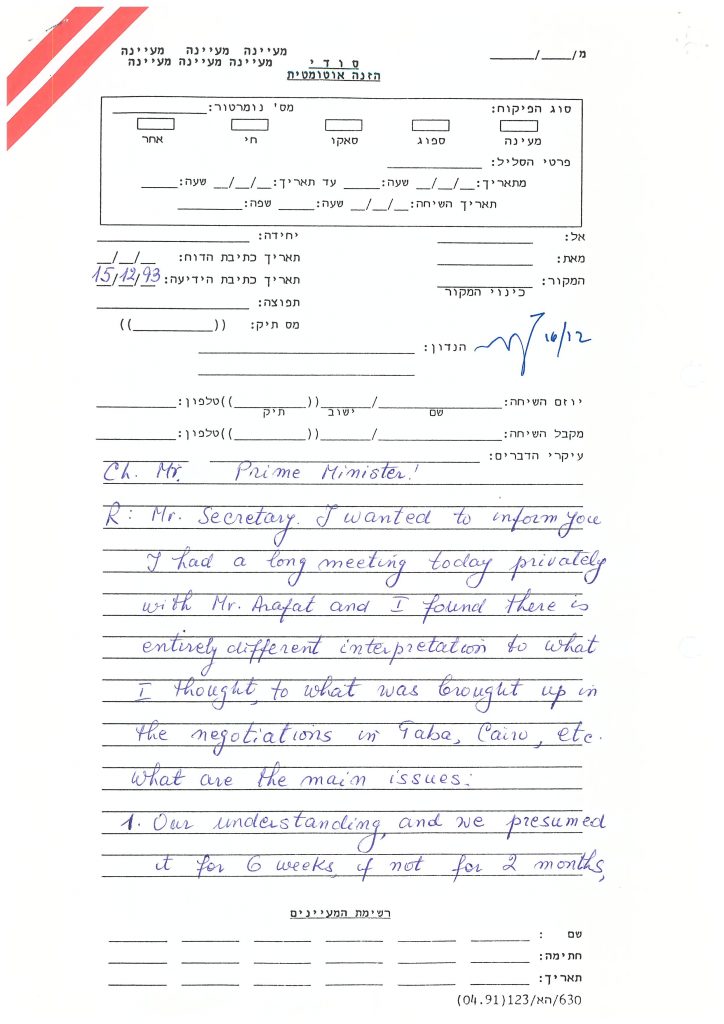
The first page of Rabin’s phone call to Secretary Christopher. Israel State Archives.
- Telephone conversation between Prime Minister and Defence Minister Yitzhak Rabin, Jerusalem, and Secretary of State Warren Christopher, Washington; [December 12 1993], call recorded on December 15 1993
Israel State Archives
Rabin describes his meeting with Arafat on the same day and the argument between them on the control of the borders with Egypt and Jordan, control of the crossing points and the size of the Jericho area. In Arafat’s view, these boundaries are his responsibility. Rabin chose not to break up the meeting and proposed to continue negotiations. In the opinion of Christopher, Arafat is testing the Israelis. Rabin added that the Egyptians were shocked by Arafat’s position. In his view, if the principle of Israeli control is accepted, a compromise can be found regarding the management of the crossings.
- Jacques Neriah, the Prime Minister’s Policy Adviser, Jerusalem, to Prime Minister and Defence Minister Yitzhak Rabin, Jerusalem; December 14 1993
Israel State Archives, A/7766/8
“Guidelines for continuing negotiations with the PLO”. Neriah’s proposal for a “package” of mutual Israeli and Palestinian concessions on controversial issues in the negotiations on the Gaza and Jericho agreement, which will answer the need to maintain Palestinian dignity and Israel’s security requirements.
Israel State Archives, A/7702/7
Arafat presents the Palestinian stance on the controversial issues in the Gaza and Jericho agreement that led to the failure of his meeting with Prime Minister Rabin. He believes that Israel is offering the Palestinians a “ghetto” in Jericho.
- Fax message from Nabil Shaath, Cairo, to General Amnon Lipkin Shahak, Deputy Chief of Staff and Head of the Israeli Delegation; December 30 1993 (in English)
Israel State Archives, MFA/11005/1
Presents Yasser Arafat’s reservations about the agreement reached in Cairo and further demands.
- Amnon Lipkin Shahak, Deputy Chief of Staff and Head of the Israeli Delegation, Jerusalem, to Nabil Shaath; January 2, 1994 (in Hebrew and English)
Israel State Archives, A/7760/3
Shahak presents Prime Minister Rabin’s views on the subjects in dispute, in light of Arafat’s objections to the agreement on Gaza and Jericho prepared in Cairo. Israel’s principles with regard to external security, international crossings, the size of the Jericho enclave, the Gaza Strip, control of the roads and security arrangements.
Israel State Archives, MFA/11005/1
Peres insists that the Palestinians cannot unilaterally renege on the agreements reached in Cairo on controversial issues. Sha’ath replies that the PLO remains true to the Declaration of Principles and is ready to reopen the Taba negotiations based on the talks in Cairo and Sarpsburg.
- Oded Eran, Assistant Deputy General in Charge of Economics at the Foreign Ministry, Jerusalem, to Uri Savir, Director General of the Foreign Ministry, Jerusalem, January 12, 1994
Israel State Archives, MFA/10434/10
A talk with Maher el-Kurd, Arafat’s economic adviser, at a meeting of Cairo businessmen, on various aspects of the economic agreement and Arafat’s concerns about the agreement.
- Eytan Benzur, Deputy Director General of the Foreign Ministry, Jerusalem, to Eitan Haber, Head of the Prime Minister’s Bureau, Jerusalem; Report on Meeting of Stanley Sheinbaum with Yasser Arafat on January 12 1994 (in English)
Israel State Archives, A/7705/6
Sheinbaum’s impression of Arafat’s approach to negotiating the Cairo agreement, his mood and the internal relations in the PLO leadership. There is no understanding between him and Rabin. Despite his weaknesses, there is no substitute for his leadership. The elections in the PA should be speeded up.
26. Telephone conversation between Prime Minister and Defence Minister Yitzhak Rabin and Foreign Minister Shimon Peres; [21 January 1994] recorded on 24 January 1994
Israel State Archives
Guidelines for Peres’ forthcoming talk with Arafat, apparently before their meeting in Oslo at Foreign Minister Holst’s funeral. Rabin is anxious to avoid further erosion of Israel’s position.
27. Jacques Neriah, the Prime Minister’s Policy Adviser, Jerusalem, to Prime Minister and Defence Minister Yitzhak Rabin and Shimon Sheves, Director-General of the Prime Minister’s Office, Jerusalem; 23 January 1994
Israel State Archives A/7760/4
Critical comments on the “Draft Agreement” with the PLO of 22 January 1994 in which Peres and Arafat agreed on a “package deal” where Israel will be responsible for security on the Egyptian border and along the length of the border with Jordan. The Palestinians will be responsible for providing services in the Palestinian wing of the border crossing. Agreements were also reached on preventing Palestinians entering without a permit, access to the holy sites near Jericho, the size of the Katif settlement bloc in Gaza, etc. The draft is subject to approval by Prime Minister Rabin.
27A. Draft Agreement on Gaza and Jericho with the PLO, 22 January 1994
Israel State Archives A/7760/4
28. Eytan Benzur, Deputy Director General of the Foreign Ministry, Jerusalem, to the Israel Embassy in Washington; 23 January 1994
Israel State Archives, MFA/10985/8
A talk with Judith Kipper, a US Middle East specialist, on her meetings with local Palestinian leaders who spoke of the growing alienation between them and the PLO leadership in Tunis. They would like a democratic regime in the self-governing authority on a Western or Israeli model. Her conclusion: Israel should establish ties with these leaders.
29. Information Division, Foreign Ministry, Jerusalem to Israel’s Missions Abroad; 24 January 1994
Israel State Archives, MFA/8582/1
An interview with Shimon Peres on Israel radio where he described his meeting with Arafat in Oslo and the proposed agreement on Gaza and Jericho.
30. The Israeli Delegation for Implementation of the Agreement on the Gaza Strip and Jericho, the Civilian Affairs Committee: Selected Documents and Records of Meetings, The 14th Round of the Taba Talks; 26 January 1994
Israel State Archives, A/7766/3
Part of a handbook issued by the Planning Branch of the IDF General Staff, presenting records in English and Hebrew on talks with the Palestinian delegation on 24 January 1994. The document discusses co-operation in the field of telecommunications and setting up a radio station for the Palestinian Authority.
31. Update for the Prime Minister; Jerusalem, 27 January 1994
Israel State Archives
Record of a meeting attended by Foreign Minister Peres, members of delegation to the talks with the PLO and senior IDF officers on the problem of the border crossings and security arrangements in the Gaza Strip, in preparation for Peres’ meeting with Arafat in Davos.
Israel State Archives, MFA/11005/1
An interview on NBC with Shimon Peres on the chances of success of the Davos agreement.
33. Jeremy Issacharoff, Israel Minister-Counseller in Washington, to Uri Savir, Director-General of the Foreign Ministry, Jerusalem; 4 February 1994
Israel State Archives, MFA/11458/10
Reports on Foreign Minister Peres’ meeting with Secretary of State Christopher on 1 February 1994. Peres described the problems in the negotiations with the Palestinians. According to Arafat, his final aim is confederation with Jordan. Christopher believes that both sides are undergoing a useful learning process in dealing with these difficult problems together.
34. The Cairo Agreement; 9 February 1994 (in English)
Israel State Archives, MFA/11005/1
Draft agreement on Gaza and Jericho initialled on 9 February 1994.
034A: Letter from Shimon Peres, Cairo, to PLO Chairman Yasser Arafat, Cairo; 9 February 1994 (in English)
Peres confirms the arrangement between them, which was approved by Prime Minister Rabin, that the final size of the Jericho enclave will be settled between Rabin and Arafat.
35. Harry Kney-Tal, the Division for Policy Planning, Foreign Ministry: “Negotiations to Carry Out the Gaza-Jericho Agreement – First Lessons”; Jerusalem, 10 February 1994
Israel State Archives, MFA/10986/8
According to Kney-Tal, the Cairo agreement is a balanced one which preserves Israel’s security interests and exclusive control of its borders. However the conceptual gap between the two sides has not narrowed.
36. The Situation Room, Foreign Ministry, Jerusalem, to the Morning Telegrams Distribution List; 14 February 1994
Israel State Archives, A/5161/11
A summary of Director-General Savir’s comments on the Cairo Agreement at a meeting of the senior staff of the ministry. He noted that the Palestinians were surprised to hear that, in contrast to newspaper reports on a crisis between Peres and Rabin because of the Davos understandings, they were still in force. He believes that in Cairo the PLO, and especially Arafat, were forced to move from negotiating mode to taking decisions.
37. Michael Harari, the Arab World 2 Department, Foreign Ministry, Jerusalem, to Policy Telegrams Distribution List (Prime Minister, Foreign Minister, Defence Ministry etc.); 15 February 1994
Israel State Archives, A/7702/4
A report on Palestinian reaction to the initialling of the Cairo Agreement. Most media reaction in the territories ranged from reservations and criticism to complete rejection. Many claim that Israel has scored a success. The test will be the nature of the practical steps to carry out the agreement.
38. Yehuda Lancry, Israel Ambassador in Paris, to the Director of the European Division, Jerusalem; 15 February 1994
Israel State Archives, A/7702/6
A report on the talks held by Knesset member Benjamin Netanyahu, who headed an opposition delegation to France, and other spokesmen for the Likud party with French Foreign Minister Alain Juppé. Netanyahu explained the basis for their opposition to the government’s peace policy. He believes that the government will establish a Palestinian state. Juppé expressed support for the policy and asked if a different government would be committed to the agreements.
39. Miri Einy, the Arab World 2 Department, Foreign Ministry, Jerusalem, to Policy Telegrams Distribution List (Prime Minister, Foreign Minister, Defence Ministry etc.); 15 February 1994
Israel State Archives, MFA/10986/8
A report on a joint Egyptian-Palestinian initiative to hold a census of people displaced in 1967 living in the Gaza Strip.
40. Major-General Dani Rothschild, the Coordinator of Government Operations in Judea and Samaria and the Gaza District, Washington, to Prime Minister and Defence Minister Yitzhak Rabin and Foreign Minister Shimon Peres, Jerusalem; 16 February 1994
Israel State Archives, A/7702/6
A talk with Saeb Erekat, the head of the Palestinian delegation in Washington, on the establishment of a Legislative Council in the Palestinian Authority and an executive body to administer self-rule. The Israeli side believes that according to the Declaration of Principles this should be the same body.
41. Excerpt from an Update for Prime Minister and Defence Minister Yitzhak Rabin from the Delegation to the Talks on Gaza and Jericho; Jerusalem, 20 February 1994
Israel State Archives
After Major-General Uzi Dayan had presented several alternative scenarios for IDF withdrawal from the Gaza Strip, the head of Southern Command, Major-General Matan Vilnai, expresses his concerns about the transition period between the withdrawal and the Palestinian police force’s takeover of control. He believes this period should be as short as possible. Rabin agrees with his view.
42. Yosef Hadas, Chairman of the Working Group on Refugees, Jerusalem, to Deputy Foreign Minister Yossi Beilin and the Assistant Director-General in charge of the Middle East, Jerusalem; 21 February 1994
Israel State Archives, MFA/10135/4
A report on the progress made at a meeting of the multi-lateral negotiation group on refugees in Tunis to define the concept of ‘family’ in the family reunion scheme
43. Weekly Political Briefing by the Centre for Policy Research and Planning; Jerusalem, 22 February 1994
Israel State Archives, A/7702/6
An update on the peace process: the Palestinians are pleased with the rate of progress in the Taba talks and in Washington. It seems that since the Cairo agreement was initialled, Arafat is interested in speeding up the talks with Israel and tangible measures such as release of prisoners. Agreements have been reached on the Palestinian police force and its links with the IDF and on the transfer of civilian powers.
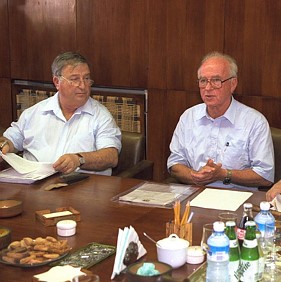
Prime Minister Rabin and the finance minister, Avraham Shochat, 15.8.1993. Photograph: Zvika Yisraeli, GPO
Israel State Archives, A/7760/4
The Palestinians have reneged on some of the understandings reached with Israel. After talks between Abu Ala and Finance Minister Shochat, Israel submitted a draft proposal for an overall agreement, mainly on customs rates. The Palestinians submitted a counter proposal. Israel made it clear that the alternative to its proposal was complete exclusion of Gaza and Jericho from the Israeli market, including the labour market. Flato believes Israel should prepare for this eventuality while continuing talks on an agreement. Includes draft proposals in English.
45. Major Benny Lavie, Bureau of the Deputy Chief of General Staff [Tel Aviv], to Uri Savir, Director-General of the Foreign Ministry, Jerusalem; 25 February 1994
Israel State Archives, MFA/10429/2
The results of the 16th round of talks, which took place in Cairo on 21-23 February 1994.
46. Jacques Neriah, the Prime Minister’s Policy Adviser, Jerusalem, to Prime Minister and Defence Minister Yitzhak Rabin and Shimon Sheves, Director General of the Prime Minister’s Office, Jerusalem; 25 February 1994
Israel State Archives, A/7760/4
Passes on a message from the American embassy about a talk between Abu Maazen and the US chargé d’affaires in Tunis. Abu Maazen emphasized the need to reach an agreement before the target date of 13 April. On that date Israel should start to let in Palestinian police officers to begin carrying out the agreement. The subjects remaining to be settled between Rabin and Arafat are the demand for a Palestinian policeman on the Allenby Bridge, the size of the Jericho enclave, the question of a Palestinian passport. Abu Maazen proposes a meeting around 15 March.
47. Statement by Prime Minister and Defence Minister Yitzhak Rabin on the Murders in Hebron; 25 February 1994
Israel State Archives, A/7707/5
Following the massacre in the Cave of the Patriarchs in Hebron by Baruch Goldstein, an extreme right wing activist, a statement was issued by Rabin. The prime minister, the government and the citizens of Israel condemn in the most severe terms “this terrible murder of innocent civilians which occurred in the middle of Moslem Ramadan prayers” by Baruch Goldstein, an extreme right wing activist.
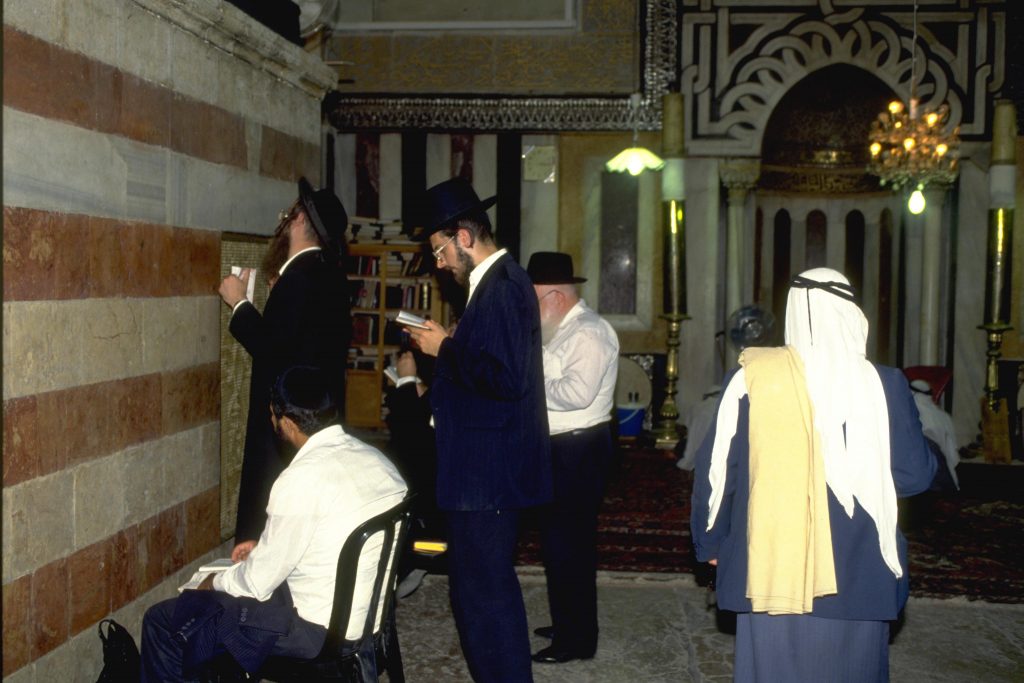
Men at prayer in the Isaac Hall of the Tomb of the Patriarchs, August 1993. Until the massacre there was no separation between Jews and Muslims at the site. Photograph: Moshe Milner, GPO
47A. Information Division, Foreign Ministry, Jerusalem to Israel’s Missions Abroad (in English); 25 February 1994
Israel State Archives, A/7707/5
Translation of the prime minister’s statement.
48. Government Decision Following the Massacre in Hebron; 25 February 1994
Israel State Archives, A/7707/5
The government expresses its shock and horror following the murders, expresses condolences to the families of the victims and will pay them compensation. The government calls on all citizens to act with restraint. The IDF and the security forces will do everything possible to prevent incitement, violence and steps that will aggravate the situation. The government will act to investigate the events and is determined to continue in its efforts to advance the peace talks.
English translation on the MFA website
49. Situation Room, Foreign Ministry, Jerusalem, to Israel’s Missions Abroad; 25 February 1994
Israel State Archives, A/7707/5
A survey of reports in the Israeli and Arab media on events following the massacre of Arab worshippers in Hebron. Arafat has called for an emergency session of the UN Security Council.
Israel State Archives, A/7707/5
President Bill Clinton’s statement following the massacre in Hebron. After condemning the crime, he proposed to invite all the negotiators to Washington in order to speed up the negotiations and reach agreement, turning the tragedy into a catalyst for further progress and reconciliation.
51. Coordination Division and Situation Room, Foreign Ministry, Jerusalem to Israel’s Missions Abroad; 26 February 1994
Israel State Archives, A/7707/5
Data on the number of victims in the massacre and the disturbances which followed it and a survey of reaction in the Arab world and among the Palestinians. Arafat told the NBC station that they had lost confidence in the peace process. Israel was responsible for the delays. He believed that the massacre was the result of a conspiracy and the IDF was involved.
Israel State Archives, A/7707/5?
Proposes to station UN civilian observers in the occupied territories. In the past Israel opposed stationing UN military observers there, but this idea could help to overcome Palestinian mistrust .
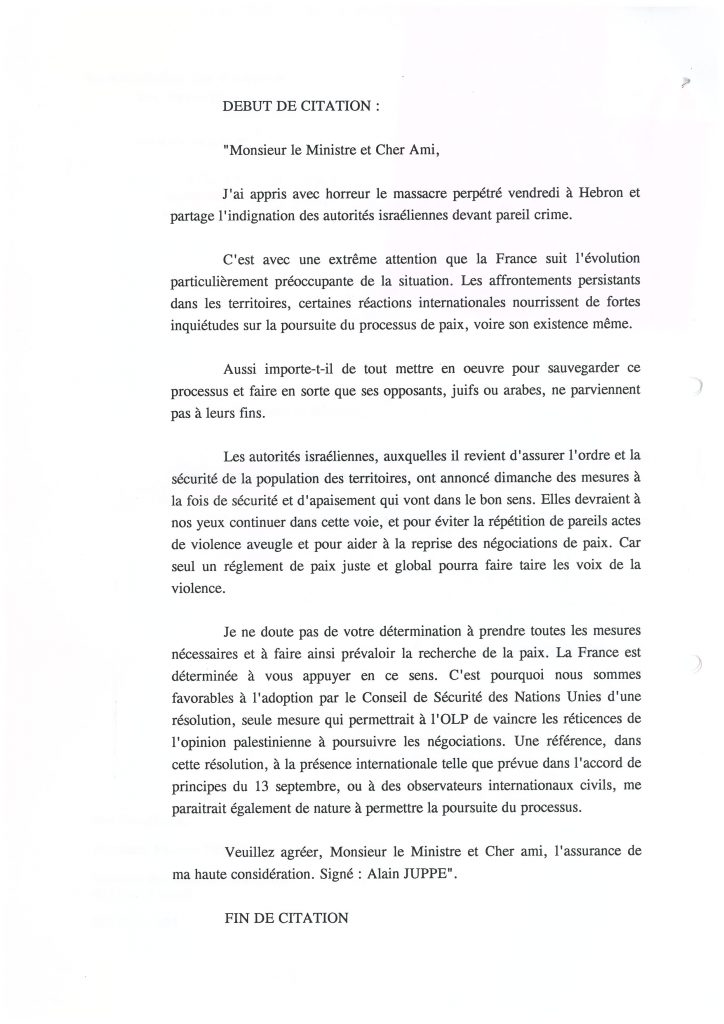
Message to Foreign Minister Peres from the French foreign minister following the Hebron massacre, 1 March 1994. ISA, File MFA/8570/1
53. Daily Event Report from the Centre [for Political Research and Planning]; February 27, 1994
Israel State Archives, A/7707/5
More updates on Palestinian reactions and those of the Arab world to the Hebron massacre. Arafat to the BBC: “In general and in principle we have accepted the Clinton initiative, but at the same time we are waiting for the Israeli government to take steps with regard to this massacre.” The reactions of the Palestinian opposition and Hamas spokesmen in Jordan.
54. International Daily Update on the Middle East by the Centre for Political Research and Planning, International Section 1; February 27, 1994
Israel State Archives, A/7707/5
American reaction following the massacre in Hebron.
Israel State Archives, GL/23301/7
His assessment of the state of the peace process after the massacre in the Cave of the Patriarchs.
56. Government Decision; February 27 1994
Israel State Archives, A/7707/5
At the government meeting the following steps were decided on: establishment of a judicial commission of inquiry on the massacre in Hebron, administrative detention of extremists, release of Palestinian prisoners, restriction on carrying weapons, establishing new security arrangements for prayers in the Cave of the Patriarchs.
57. Aaron Jacob, Israel Mission to the UN, New York, to Johanan Bein, Assistant Director General for International Organizations and Avraham Millo, Director of the International Organizations Division, Foreign Ministry, Jerusalem; February 28 1994
Israel State Archives, A/7707/5
Report on the negotiations between the US, Egyptian and PLO delegations at the UN regarding the motion for a resolution to be submitted to the Security Council following the massacre in Hebron. The first part of the Security Council debate.
58. Prime Minister and Defence Minister Yitzhak Rabin’s Knesset Statement Following the Massacre in Hebron; Jerusalem, February 28, 1994
Israel State Archives, A/7707/5
The prime minister condemns the murder and murderer, expresses his sympathy for the pain of the Palestinians. He announces the establishment of a commission of inquiry and steps taken against extremists such as restraining orders, and the release of Palestinian prisoners and detainees. The Cave of the Patriarchs will only re-open after new security arrangements are established. The attorney general has been tasked with examining the outlawing of extremist organizations. Israel will continue the peace process and even accelerate it. Rabin invites the Palestinians to return to the discussion table. However, Israel will not compromise on principles that will ensure its security.
59. Summary of a Meeting of Senior Staff at the Foreign Ministry; Jerusalem, February 28, 1994
Israel State Archives, MFA/8621/9
It was argued that the February 27 government decisions including the establishment of a commission of inquiry do not change the international situation, are not relevant to the peace process and will only help a little. Consideration should be given to improving the security situation for Palestinians and preventing friction with the settlers during the interim settlement. Proposals included a series of steps to revive negotiations, including speeding up negotiations for the withdrawal deadline (April 13 1994), accepting the demand for an international presence, removal of the Jews from the Romano House settlement in Hebron and more.
60. Weekly Political Briefing from the Centre for Political Research and Planning, Foreign Ministry; Jerusalem, March 1 1994
Israel State Archives, A/7707/6
Analysis of the reaction to the massacre in Hebron among the Palestinians and in the Arab countries.
61. Coordination Division and the Situation Room of the Foreign Ministry, Jerusalem, to Morning Telegram Distribution List; March 1 1994
Israel State Archives, A/7707/6
Reports from Israel’s diplomatic missions on the global response to the massacre in Hebron.
62. Aaron Jacob, Israel Mission to the UN, New York, to Johanan Bein, Assistant Director-General for International Organizations and Abraham Millo, Director of International Organizations Division 2; March 1 1994
Israel State Archives, A/7707/6
Reports on a meeting with Madeleine Albright, the US ambassador to the UN, where they discussed a working paper prepared during US negotiations with the Egyptian delegation and the PLO on the wording of the resolution to be adopted by the Security Council and conditions for resuming the negotiations.
Israel State Archives, MFA/8582/3
Foreign Minister Shimon Peres’ statement at a press conference at the International Conference on Jewish Media: it is the government’s responsibility to prevent further acts of violence and harm to innocents. It will take all measures necessary. Israel will not hesitate to act against Goldstein’s supporters and to confiscate weapons and prevent access to sensitive areas if needed. It would like to return to the negotiating table as soon as possible. The PLO is the partner in the process.
64. Record of Foreign Minister Shimon Peres’ Meeting with Russian Deputy Foreign Minister Igor Ivanov; March 2 1994
Israel State Archives, MFA/8621/10
Ivanov had visited Tunis to help renew talks between Israel and the PLO. At first, Arafat claimed that military personnel were involved in the massacre and said that confidence in the peace process was completely undermined. Then he demanded guarantees for Palestinian security, an international military force, the disarming of the settlers, and the mention of Jerusalem in the Security Council’s resolution to condemn the massacre. Peres said the crime was committed by a single crazy man and an international force would not have prevented it. He opposed the idea proposed by the Russians – re-convening the Madrid Conference, and asked them to coordinate their steps with the United States.
65. Review by the International Organizations Division in the Foreign Ministry in Preparation for a Government Meeting; Jerusalem, March 3 1994
Israel State Archives, MFA/8593/11
Review of statements made in the Security Council debate on Hebron, continued contacts on the issue of Jerusalem, an international presence in the territories.
66. Centre for Political Research and Planning, Jerusalem to the Bureau of the Director-General of the Foreign Ministry, Jerusalem; March 3,1994
Israel State Archives, MFA/8593/11
Summarizes Arab reactions to the Hebron massacre.
67. Itamar Rabinovich, Israel Ambassador to Washington, to Prime Minister and Defense Minister Yitzhak Rabin and Foreign Minister Shimon Peres, Jerusalem; March 4 1994
Israel State Archives, A/7702/6
A briefing from Dennis Ross on the Americans’ talks with Nabil Shaath on March 2. According to Ross, the Palestinians want to return to the talks in order to meet the April 13 deadline for the implementation of the agreement, but it is difficult for them to do so. The Americans do not want to act as intermediaries and are trying to get the talks restarted. The Palestinians proposed a series of immediate and long-term measures. They insist on mentioning Jerusalem as part of the Occupied Territories in the Security Council resolution. The Americans oppose this. Shaath proposed voting by clauses that would allow the US to abstain.
68. Message to Yasser Arafat; March 4 1994 (unsigned, in English)
Israel State Archives, A/7763/28
Arafat must prevent violent outbreaks and acts of revenge by Fatah following the massacre in Hebron. The peace process is at a critical stage. Any violent action will undermine Israel’s relations with the PLO. The dialogue between the parties is based on the September 9 commitments to Prime Minister Rabin and Norwegian Foreign Minister Holst.
69. David Sultan, Israel Ambassador in Cairo to Uri Savir, Director General of the Foreign Ministry, Jerusalem; 7 March 1994
Israel State Archives, MFA/8568/2
Reports on the mission of Jacques Neriah and Amos Gilad to Arafat. Neriah detailed Israel’s steps following the Hebron massacre. Rabin is proposing to resume negotiations and to conclude and implement the agreement within six weeks, on the basis of the previous understandings. He suggests negotiating in Cairo (not Washington). Arafat claimed that the main problem was to calm the Muslim world. He demanded an international presence, firstly in Hebron, transfer of extremist settlers to another location; discussion of the other settlements after signing the agreement and prohibition on carrying weapons by settlers. Israel must not prevent the Security Council from passing a resolution because of Jerusalem. Neriah tried to find out if Arafat’s demands were a condition for resuming talks and proposed a meeting with the prime minister. Arafat said the date of the withdrawal could not be changed.
70. “Proposals to resume negotiations with the PLO”; March 8 1994
Israel State Archives, A/7766/8
An unsigned document found among the papers of Jacques Neriah, the prime minister’s political adviser.
71. Michael Harari, Arab Affairs Department 2, Foreign Ministry, Jerusalem, to Political Telegrams Distribution; March 8 1994
Israel State Archives, MFA/11005/2
A summary of the situation of the Palestinians six months after the signing of the Declaration of Principles.
72. Johanan Bein, Assistant Director-General for International Organizations in the Foreign Ministry, to Foreign Minister Shimon Peres; March 9 1994
Israel State Archives, MFA/8579/3
A review of the United States’ position on Jerusalem in its UN votes on this issue since 1984.
73. Margalit Geva, the Israel Embassy in Cairo, to the Foreign Ministry, Department 2; March 10 1994
Israel State Archives, MFA/10434/9
The PLO terms for resuming talks.
Israel State Archives
Rabin proposes another meeting to discuss Israeli and Norwegian proposals, which could replace some of the Palestinian demands. He complains about threats and personal attacks against him, saying that he wanted to take stricter measures, but Israeli law and the court restricted him. Arafat talked about the opposition to him among the Palestinian public.
Israel State Archives, GL/23301/7
Rabin describes the peace process with the Palestinians after the massacre in the Cave of the Patriarchs. He emphasizes his commitment to Jerusalem and mentions his personal difficulty in signing the Declaration of Principles. With all its understanding for the feelings of the Palestinians, Israel will not compromise on security issues.
Israel State Archives
As the Security Council vote approaches, Rabin presses Arafat to return to the negotiations with Israel. The Egyptians are involved in helping to restart the talks and Rabin prefers to hold them in Cairo or Taba. Israel will accept Larsen’s latest proposal on Hebron if the Palestinians agree to it.
Israel State Archives
Arafat accepts the agenda for talks in Tunisia – an arrangement in Hebron and continued negotiations for Gaza and Jericho first. Rabin again tried to convince Arafat to agree to Peres’ arrival in Tunisia, without success.
77. Minutes of a meeting between Foreign Minister Shimon Peres and Faisal al-Husseini; [Tel Aviv] March 18 1994
Israel State Archives, A/8084/4
The conversation, aimed at bringing the Palestinians back to the negotiating table, focused on their demands to move the settlers out Hebron and to disarm the settlers, the establishment of a joint police force and bringing forward the the introduction of a Palestinian police force into Hebron. Al-Husseini fears the loss of the PLO’s credit among the Palestinian population.
78. Israel Embassy in Washington to the Office of the Director-General of the Foreign Ministry, Jerusalem (in English); March 18 1994
Israel State Archives, A/7707/7
Secretary of State Warren Christopher’s statement at a press conference following the Security Council resolution on the Hebron massacre. Christopher explained why the United States abstained from a veto, despite its opposition to the paragraph on Jerusalem.
79. Gad Yaacobi, Israel Ambassador to the United Nations, New York, to Yohanan Bein, Assistant Director-General for International Organizations, Foreign Ministry, Jerusalem; March 18 1994
Israel State Archives, A/7707/7
Summary on the Security Council resolution and its implications.
80. Itamar Rabinowich, Israel Ambassador to Washington, to Joseph Lamdan, Director of the North American Division, Foreign Ministry, Jerusalem; March 18 1994
Israel State Archives, A/7707/7
Sums up the diplomatic activity in Washington surrounding the Security Council debate: despite pressure for a US veto in Jewish circles, the Security Council passed a resolution condemning the events in Hebron. The Administration decided not to cast a veto and settled for abstaining on two paragraphs, one of which concerns Jerusalem. Israeli-Palestinian agreement has been reached to renew their contacts and an American team will leave for the Middle East within days.
81. Memorandum by Harry Kney-Tal, “The Situation on the Eve of Resumption of Negotiations with Palestinians – Its Significance for Israel”; Jerusalem, March 20 1994
Israel State Archives, MFA/8621/8
Analyzes the state of negotiations with the Palestinians after the massacre in the Cave of the Patriarchs. Submits a series of proposals to speed up the negotiations, in the light of lessons learned from the previous rounds of talks.
82. Summary of the Talks [on the Hebron Agreement] (in English); Tunis, March 21, 1994
Israel State Archives, MFA/8568/2
The Israeli and PLO delegations agreed on a number of principles for further negotiations; participation in the conference of states contributing to the Palestinian police in Cairo on March 24; return to the talks on Gaza and Jericho with a view to concluding them as soon as possible.
83. An Update on the Talks at the Defence Minister’s Bureau; [Tel Aviv], March 25, 1994
Israel State Archives
A meeting at the defence minister’s bureau, where those present were updated on the progress of the talks with the Palestinians on Hebron. According to Shahak, they revolved around the international presence and its functions, the source of authority of the Palestinian Authority in Hebron and the joint patrols. Rabin said that in his view, the Palestinian police was less of a problem, but rather the international presence.
84. Joel Alon, Israel Ambassador to Oslo to the Foreign Ministry, Jerusalem; March 25, 1994
Israel State Archives, MFA/10434/10
A statement by the Norwegian Foreign Ministry on a meeting chaired by the foreign minister, Bjorn Tore Godal, with the participation of 25 countries, on international contributions, the establishment and location of Palestinian police forces in Gaza and Jericho, after the parties’ agreement in principle was reached.
85. Excerpt from a Meeting at the Defence Minister’s Bureau: Guidelines for the Talks; [Tel Aviv], March 28 1994
Israel State Archives
A discussion between Chief of Staff Barak, the foreign minister, the legal advisers and Gen. Yatom on the source of authority of the Palestinian police in Hebron and the possibility of subordinating it to the Israel Police.
86. Centre for Political Research and Planning, Foreign Ministry: Daily Report; Jerusalem, March 29 1994
Israel State Archives, A/7705/6
A collection of reports about the peace process from the PLO and the Arab states, including Arafat’s response to an incident in which six members of Fatah’s “Hawk” fighters’ organization were killed by IDF soldiers in the Jabaliya refugee camp in Gaza. Arafat claimed that this was a new secret organization within the the army and the settlers who wanted to thwart the process. He would call an emergency meeting of the PLO leadership. In Jabaliya there was a general strike and clashes with the IDF. Nevertheless, progress is being made on the Hebron Agreement.
87. Information Division, Foreign Ministry, Jerusalem, to Israel’s Missions Abroad; March 31 1994
Israel State Archives, MFA/8621/10
Sends the missions the text of the agreement signed in Cairo that day between Amnon Shahak and Nabil Shaath on the establishment of an international presence in Hebron and the resumption of negotiations on the Jericho and Gaza agreement.
88. Bureau of the Director-General, Foreign Ministry, Jerusalem to Israel’s Missions Abroad (in English); March 31 1994
Israel State Archives, A 7705/13
The text of the joint press release published by members of the Israeli and Palestinian delegations on the signing of the Hebron agreement and the negotiations on the Gaza and Jericho agreement.
89. Margalit Geva, Israel Embassy in Cairo to the Arab Affairs Department 2, Foreign Ministry, Jerusalem; April 3 1994
Israel State Archives, 10429/3
Summary of an interview with Farooq Kadumi, chairman of the PLO’s Political Department: East Jerusalem is part of the occupied Palestinian land, the United States should not recognize Jerusalem as Israel’s capital, Rabin does not want peace, Israel wants to subdue the Palestinian people and annex the West Bank and the Gaza Strip. He opposes the Oslo Accords but accepted the principle of negotiation as a means of political action to obtain rights while continuing the uprising. The agreement must be fulfilled in order to create an atmosphere for coexistence with the Israelis. There is no longer any military option for the Palestinians.
90. Eytan Haber, Director of the Prime Minister’s Bureau, Jerusalem, to Prime Minister and Defence Minister Yitzhak Rabin [Jerusalem], Chief of Staff Ehud Barak, Gen. Southern Command Matan Vilnai and IDF Spokesman Ilan Tal [Tel Aviv]; April 4 1994
Israel State Archives, A 7705/6
Proposes a series of events and press conferences so that the IDF’s evacuation of Gaza and Jericho will convey the desired message to the Israeli public, to the Palestinians and the media abroad.
91. Statement by Foreign Minister Shimon Peres after the Terrorist Attack in Afula; April 6 1994.
Israel State Archives, MFA/8582/5
Condemnation of the attack in a radio interview.
92. Oded Eran, Assistant Deputy General in Charge of Economics at the Foreign Ministry, Paris, to the Paris Talks Distribution List; April 9 1994
Israel State Archives, MFA/8621/10
The talks on an economic agreement between Israel and the PLO led by Finance Minister Shohat and Abu Ala. It was agreed that the shekel would continue to be used in the autonomy but would not be called “legal tender”. A “monetary authority” would be established. The issues of the Palestinian currency and customs dues on agricultural products were not settled. The importance of an agreement with Jordan.
93. Message from Prime Minister and Defence Minister Yitzhak Rabin, Jerusalem, to Egyptian President Hosni Mubarak, Cairo; April 12 1994
Israel State Archives, A/7705/4
A message for Arafat who was about to meet with Mubarak: the need to accelerate the negotiations, we must refrain from reopening issues that have already been agreed, the security issue is the most important one, the talks are only on the interim agreement and not on a Palestinian state, difficulties caused by Arafat’s failure to condemn the attack in Afula.
94. Michael Harari, Arab AffairsDepartment 2, Foreign Ministry, Jerusalem, to the Political Distribution List; April 13 1994
Israel State Archives, A 7702/6
The Hebron agreement was very sceptically received by the peace process’s supporters, including senior members of the negotiating delegation and the general public, and with strong opposition from its opponents. However, the return of the deportees and the continued evacuation of the IDF camps in Gaza have improved the atmosphere. A major focus of opposition is in Hebron. Many residents also raise concerns about the new government and the Palestinian police and its attitude towards the population and opposition activists – this will be a “twilight period”.
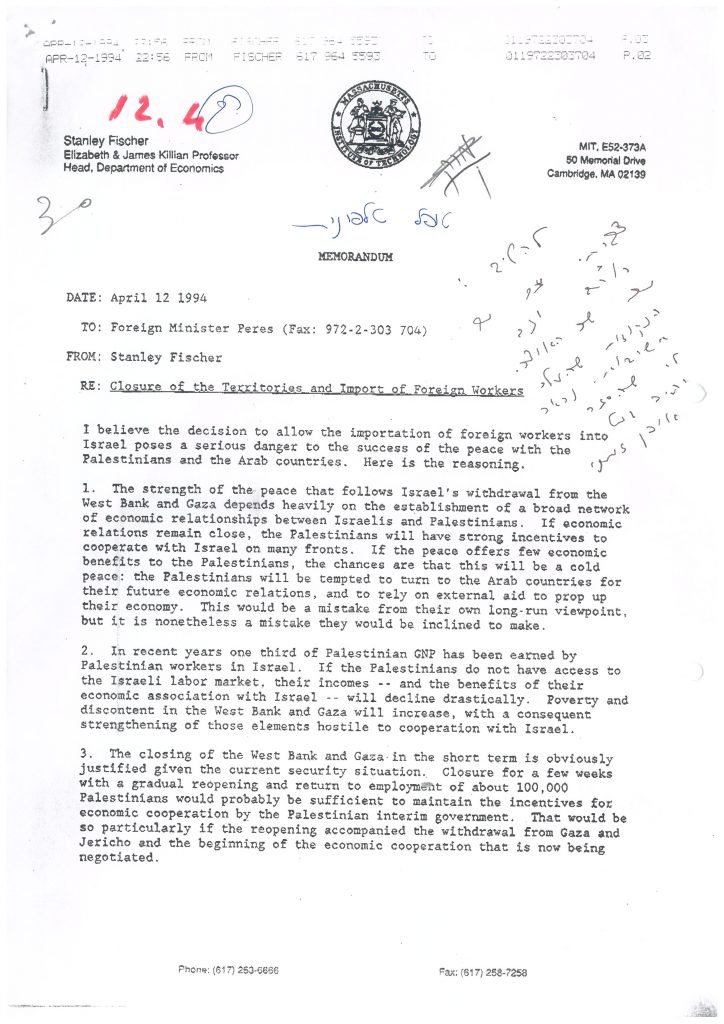
A letter from Stanley Fischer, later governor of the Bank of Israel, to Shimon Peres on the policy of closing the West Bank and Gaza and its effect on relations with the Palestinians. ISA, File MFA/8570/5
95. Meeting of Foreign Minister Shimon Peres and Faisal al-Husseini on April 10; Tel Aviv, April 17, 1994
Israel State Archives, MFA/8621/10
Al-Husseini acknowledges Peres’s remarks about the attack in Afula and condemned terrorism. He says that the internal situation makes it more difficult for them to do so in public. He raised a number of problematic issues in the Cairo agreement. Peres claims that the agreement could be signed tomorrow and the PLO did not come ready to the negotiating table. Al-Husseini asks for Peres’ intervention on the issue of the closure of Jerusalem and the case of a woman prisoner facing trial, who is on the list for release.
96. Centre for Political Research and Planning, Foreign Ministry, Jerusalem, to the Weekly Diplomatic Briefing List; April 18 1994
Israel State Archives, A/7702/5
An update on the political process, against the backdrop of the terror attack in Hadera, and on issues related to the multilateral talks.
97. Miri Einy, Arab Affairs Department 2, to the Israel Missions Abroad; April 20 1994
Israel State Archives, MFA/8621/10
A survey of the mobilization of the donor states for the establishment of the Palestinian police, which has now gone into high gear. Representatives from 25 countries participated in a conference initiated by the Norwegian government. The Palestinians want to raise a budget for current expenses, but the donor countries prefer to provide technical assistance.
98. Meetings of Foreign Minister Shimon Peres and Yasser Arafat; Bucharest, April 20 – 21 1994
Israel State Archives
Arafat says that there are still disagreements at the talks in Cairo over jurisdiction and airspace. Peres and Arafat discuss the release of Hamas prisoners and the information that the PLO promised to obtain on the MIAs from the Sultan Yaacoub battle in the 1982 Lebanese war. In the second meeting, they agree that the final round of negotiations will open in Cairo on April 24 in three committees and will continue until the agreement is signed.
99. Weekly Update from the Centre for Political Research and Planning, Foreign Ministry, Jerusalem, to the Foreign Minister’s Bureau; April 21, 1994
Israel State Archives, MFA/8593/12
Progress in Cairo on the Gaza and Jericho agreement, reports on the Lebanese and Jordanian negotiating channels and on changes in Hamas policy.
100. Information Division, Department of Communications, Foreign Ministry: Foreign Minister Shimon Peres’s Remarks to the Knesset Labour Party Faction; April 24,1994
Israel State Archives, MFA/8582/3
Peres spoke to the Knesset members on April 24 about his meeting with Arafat in Bucharest and the negotiations with the Palestinians, how the agreement will be implemented and the gaps between the parties’ positions.
101. Benny Lavie, Bureau Chief of the Deputy Chief of Staff, to the Director General of the Prime Minister’s Office Shimon Sheves and to the Chief of Staff, April 27, 1994: Summary of the Third Day of the Cairo Discussions before the Signature of the Agreement; April 26 1994
Israel State Archives, MFA /8570/7
Describes discussions in the Security Committee on the use of the Gaza maritime space, informal ‘rules of conduct’ regarding freedom of movement of Israelis and tourists, the liaison and coordination mechanism, internal passages and airspace. Details are also given of the meeting of the donor countries to the Palestinian police at the Egyptian foreign ministry.
101A Appendix (in English) on Security Cooperation, April 26, 1994
102. Eli Shaked, Political Planning Division, Foreign Ministry: A Platform for Discussion; April 28 1994
Israel State Archives, A/7706/19
Asks if there is an alternative to the PLO leadership from Tunis among the Palestinians which could negotiate with Israel. Analyzes the relations of the movement with popular leaders in the Territories and with the Hamas movement.
103. Interview with Abu Ala on Monte Carlo Radio on the Economic Agreement; April 29 1994
Israel State Archives, MFA/10429/14
Interview with Ahmad Qurei (Abu Ala) on the signing of the Economic Agreement (Paris Agreement): his views on the relationship between the Palestinian self-government and Israel. In his opinion, the talks laid the foundation for the establishment of an independent Palestinian state.
104. Excerpt from a Consultation at the Defense Minister’s Bureau; Tel Aviv, April 30 1994
Israel State Archives
Rabin makes it clear that he has no problem recognizing the Palestinians as a separate entity that is a little less than a state, but the key element is security. He does not want a security partnership with the Palestinians on Israel’s borders. He is willing to compromise on symbolic issues such as the Palestinian passport but not on the security of the surrounding land borders. Control of the sea and airspace are less important. Control of the West Bank is more important than the Golan Heights and Gaza. In his opinion, Arafat understands his considerations very well, and this is exactly why he is insisting on issues such as the size of the Jericho area and the stationing of a Palestinian policeman on the bridge. A discussion was held on “ammunition” – concessions to offer Arafat at a personal meeting with Rabin. In Rabin’s opinion, Arafat does not care much about Gaza, and he knows where his priorities are.
105. Information Division, Foreign Ministry, Jerusalem, to Israel’s Missions Abroad; May 1 1994
Israel State Archives, MFA/8582/2
An interview with the foreign minister on the TV show “Diary of the week” on April 29. His reaction to Opposition leader Netanyahu’s claim that the agreement is Arafat’s biggest victory. He explains that autonomy is independence without control of foreign affairs and security. Why shouldn’t the Palestinians have a stamp?
106. Update on the Talks at the Prime Minister’s Bureau; Jerusalem, May 2, 1994
Israel State Archives
Excerpt from a meeting attended by Foreign Minister Peres, the Chief of Staff and senior officials, in which the Deputy Chief of Staff and the director-general of the Ministry of Foreign Affairs seek to summarize final details before the signing of the Cairo Agreement. An argument between Rabin and Peres on the participation of a Turkish representative in the international presence.
107. Minutes of a Meeting between Prime Minister Yitzhak Rabin, Foreign Minister Shimon Peres, Minister for the Environment Yossi Sarid and Deputy Chief of Staff Amnon Lipkin Shahak and Yasser Arafat and Palestinian Representatives at the Cairo Presidential Palace; Cairo, May 3 1994
Israel State Archives, A/7702/5
A meeting between Rabin and Arafat for a final settlement of problematic details in the Cairo agreement. Rabin presses to get a schedule for the handover of responsibility in Gaza. Arafat’s request for an overlap period. During the meeting, President Hosni Mubarak, Foreign Minister Amr Mussa and Secretary of State Warren Christopher join in the discussion. Mubarak pressures Rabin to make gestures over the control of the Gaza coast and the size of the Jericho area in order to reach agreement. Other subjects will be reconsidered in three months’ time.
108. Information Division, Communications Department, Foreign Ministry, Jerusalem to Israel’s Missions Abroad; May 4 1994
Israel State Archives, MFA/11005/3
Speech by Prime Minister Yitzhak Rabin at the signing of the Gaza-Jericho Agreement in Cairo.
Translation on the MFA website
Map of the agreement on the MFA website
109. Information Division, Communications Department, Foreign Ministry, Jerusalem to Israel’s Missions Abroad; May 4 1994
Israel State Archives, MFA/11005/3
A simultaneous, unofficial translation of Yasser Arafat’s speech at the signing of the Gaza-Jericho agreement in Cairo, as broadcast on the first channel of Israel Radio.
110. Information Division, Communications Department, Foreign Ministry, Jerusalem to Israel’s Missions Abroad; May 4 1994
Israel State Archives, MFA/11005/3
Interview with Deputy Foreign Minister Yossi Beilin on May 4, 1994, before the agreement was signed: the Palestinian police will gradually enter Gaza and Jericho, as Israeli forces leave. Negotiations on unsettled points will continue. The negotiations on transfer of powers in areas of the West Bank not included in the autonomy and on elections to the Autonomy Council will be opened. Negotiations on the final settlement will also begin soon. Beilin believes that most Israelis have come to terms with leaving Gaza. He respects the position of the opposition and understands their pain, as long as it is expressed in legal ways.
111. Information Division, Communications Department, Foreign Ministry, Jerusalem to Israel’s Missions Abroad; May 4 1994 (in English)
Israel State Archives, MFA/11005/3
Statement by Prime Minister Yitzhak Rabin at a press conference in Cairo following the signing of the Gaza-Jericho Agreement.
112. Office of the Director-General of the Foreign Ministry, Jerusalem to the Minister’s Bureau; May 5 1994
Israel State Archives, MFA/8593/12
In preparation for a government meeting: report on the signing of the agreement in Cairo, the reactions to the agreement by the Palestinians and Arab countries, a report on the economic agreement signed in Paris and the visit of Secretary of State Christopher to the Middle East.
113. Information Division, Communications Department, Foreign Ministry, Jerusalem to Israel’s Missions Abroad; May 5, 1994
Israel State Archives, MFA/8621/10
An overview provided by the IDF spokesman on security aspects of the Cairo agreement; the negotiations on the Gaza and Jericho agreement and the security cooperation with the Palestinians.
114. Ido Aharoni, Assistant to the Director General of the Foreign Ministry, Jerusalem, to Joel Alon, Israel Ambassador to Oslo (Jerusalem) and the Charge d’Affaires at the Embassy in Oslo; May 5, 1994
Israel State Archives, A/7705/7
A meeting between Prime Minister Rabin and Norwegian Foreign Minister Godal, Terje Larsen and other Norwegian figures, in which Rabin expressed concern about the Palestinians’ ability to assume full responsibility for the territory as soon as the Gaza and Jericho agreement was signed. They had asked for a few weeks of overlap. He said he did not want to leave the Israeli forces in place, but he was worried about the possibility of chaos.
115. Benny Lavie, Bureau Chief of the Deputy Chief of Staff, to the Distribution List; [Tel Aviv] May 6, 1994
Israel State Archives, A/7764/9
Report on the 22nd and last round of talks between Israel and the Palestinians on the Gaza-Jericho agreement and on the ceremony in Cairo; Arafat’s ploy in refusing to sign the map of Jericho attached to the agreement.
116. Information Division, Communications Department, Foreign Ministry, Jerusalem,to Israel’s Missions Abroad (in English); May 8 1994
Israel State Archives, MFA/10986/8
The exchange of letters between Prime Minister Yitzhak Rabin and PLO Chairman Yasser Arafat followng the Gaza and Jericho agreement, May 4 1994.
117. Information Division, Communications Department, Foreign Ministry, Jerusalem to DPS Distribution (in English); May 8, 1994
Israel State Archives, MFA/10986/8
Ze’ev Schiff’s article ‘Arafat’s Stunt’ published in the Haaretz newspaper on May 8.
118. Arab Affairs Department 2, Foreign Ministry to the Political Distribution List; May 9, 1994
Israel State Archives, MFA/10986/8
Review of reaction in the territories following the signing of the agreement in Cairo. In general, there is no sense of a ‘historic moment’ and there are unresolved concerns about what is to come. In Judea and Samaria, the feelings are even more uncertain than in Gaza.
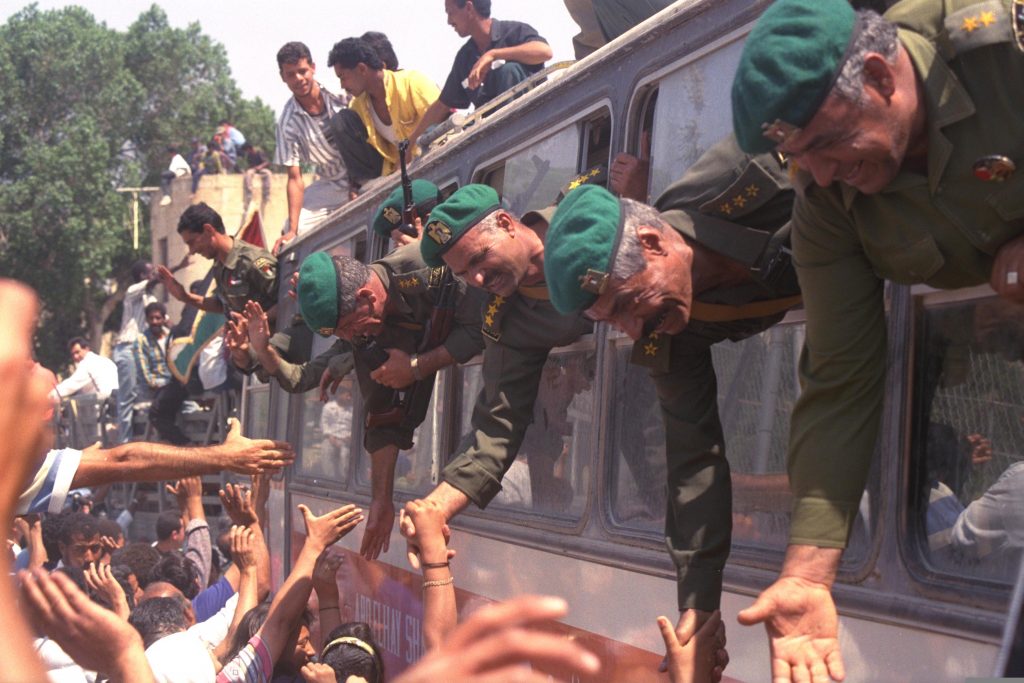
The Palestinian police arrive in Jericho, 13.5.1994. Photograph: Avi Ohayon, GPO
119. Arab Department 2, Foreign Ministry to the Political Distribution List; May 17 1994
Israel State Archives, MFA/10986/8
A report on the difficulties of Arafat and the PLO in putting together the PA.
120. Meeting between Foreign Minister Shimon Peres, PLO Chairman Yasser Arafat, former President Jimmy Carter and Norwegian Foreign Minister Bjorn Tore Godal; Oslo, May 18, 1994
Israel State Archives, MFA/8621/8
Arafat summarizes the situation following the first steps towards implementation of the Palestinian Authority plan and the entry of the Palestinian police into Gaza and Jericho. Despite expressions of joy by the residents, he fears extreme activities against him. Peres presents the economic problems and the deficit that will be created even if all the donor countries live up to their promises. He asks Carter to contact President Clinton to increase U.S. aid. The president should set up a peace fund. Further discussion between Peres and Arafat on continued talks, coordination with Jordan and Arafat’s remarks in Johannesburg.
121. Press Department, Foreign Ministry, Jerusalem, to the Israel Embassy in Washington, for the Foreign Minister’s Assistants; May 24 1994
Israel State Archives, MFA /10986/9
Arafat’s announcement, as published in the Al-Quds newspaper, on changing the legal situation in the Occupied Territories and repealing laws and orders that were in effect after 1967, and the response of Legal Adviser Joel Singer: the statement is meaningless and and has no validity; military orders are still in effect, the statement is a violation of the agreement.
122. Zvi Inbar, Knesset Legal Adviser, Jerusalem, to Knesset Speaker Shevach Weiss, Jerusalem; June 7, 1994
Israel State Archives, A/7702/5
Refers to Knesset Member Zeev B. Begin’s letter of June 6 following the government’s announcement of the signing of the Cairo agreement. Begin argues that the government has failed to introduce various documents related to the negotiations and the status of Jerusalem. Attached is a letter to the Norwegian Foreign Minister from Foreign Minister Peres dated October 11, 1993.
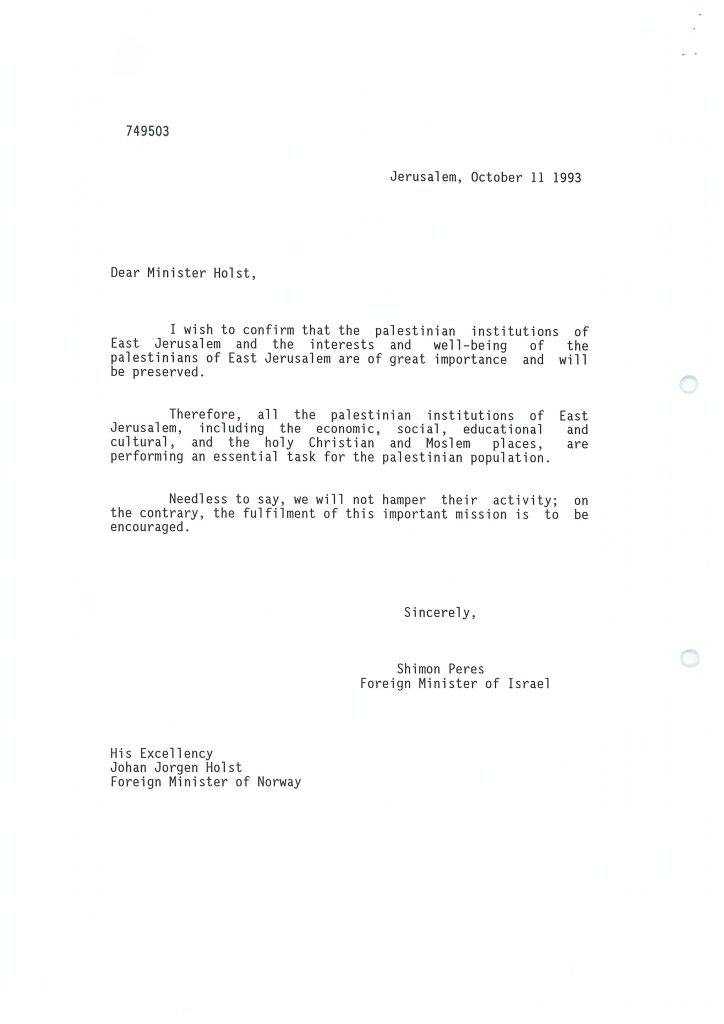
Peres’ letter to Holst. Israel State Archives, File MFA/8582/5
123. Arab Affairs Department 2, Foreign Ministry, Jerusalem, to Political Telegram Distribution List; June 7 1994
Israel State Archives/ MFA/10986/9
Analysis of Arafat’s anticipated moves in preparation for the next stage of negotiations: Arafat regards the Cairo agreement as a necessary evil, which is only a first step towards a Palestinian state. He is aware of the opposition in the Palestinian arena and his statements are intended for Palestinian ears. The realization of the agreement will not weaken but rather strengthen the Palestinian intent to work for the establishment of a state. He will try to shorten the interim period and speed up the negotiations on the permanent settlement and to put issues such as Jerusalem on the table.
124. Department of Information, Jerusalem, to Israel’s Missions Abroad; June 8 1994
Israel State Archives/ MFA/8582/2
The foreign minister’s appearance on a programme with journalist Dan Margalit on the second TV channel on 7 June. His explanations on the subject of his letter to Norwegian Foreign Minister Holst in October 1993 on the status of the Palestinian institutions in East Jerusalem. This policy was also announced in a Knesset statement before the Oslo agreement was signed. Arafat’s claims about the letter in his speech in Johannesburg are unfounded. Israel should advance the expansion of autonomy to all Arab communities in the West Bank.
125. Situation Room, Foreign Ministry, Jerusalem, to the Morning Telegrams Distribution List; June 13 1994
Israel State Archives, MFA/10986/9
Interim summary of the situation since the signing of the Cairo agreement by the director general of the Foreign Ministry, Uri Savir, in a meeting with senior officials from the EU Foreign Policy Troika, held on June 8 in Brussels. He expresses concern that excessive attention to details leads to lack of appreciation of the historical significance of the agreement. Israeli and Palestinian criteria for its success. In his view the process is irreversible and Israel will continue to adhere to it.

